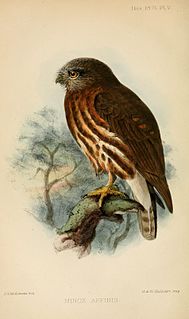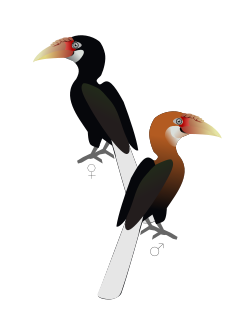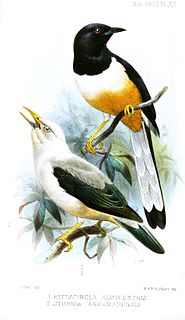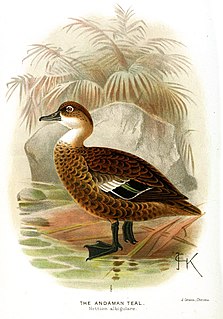 W
WThe Andaman masked owl is a barn owl endemic to the southern Andaman Islands, an archipelago between India and Myanmar, in the Bay of Bengal. Regarded by some authors as a subspecies of the common barn owl, it is recognized by others as a species in its own right.
 W
WThe Andaman serpent eagle is a species of bird of prey in the family Accipitridae. It is endemic to the Andaman Islands in southeast India.
 W
WThe Andaman woodpecker is a species of bird in the woodpecker family Picidae. It is endemic to the Andaman Islands in India. Its natural habitat is tropical moist lowland forests. It is threatened by habitat loss.
 W
WThe Andaman bulbul is a member of the bulbul family of passerine birds. It is endemic to the Andaman Islands. It has a mainly olive-yellow plumage and has most of the head olive. It feeds on small fruit and berries, but will also take insects.
 W
WThe Andaman coucal or brown coucal is a species of non-parasitic cuckoo found in the Andamans, Coco and Table Islands. It is sometimes treated as a subspecies of the greater coucal. It is found mainly in forested habitats and thickly covered gardens.
 W
WThe Andaman crake is a bird species in the family Rallidae. It is endemic to the Andaman Islands of the eastern Indian Ocean.
 W
WThe Andaman drongo is a species of bird in the family Dicruridae. The species is endemic to the Andaman Islands of the Indian Ocean. There are two subspecies, the nominate race being found across the main islands of the archipelago, and the race dicruriformis occurring on Great Coco Island and Table Island in the north of the chain.
 W
WThe Andaman flowerpecker is a species of bird in the family Dicaeidae. It is endemic to the Andaman Islands.
 W
WThe Andaman hawk-owl or Andaman boobook is a species of owl in the family Strigidae. It is endemic to the Andaman Islands.
 W
WHume's hawk-owl or Hume's boobook is a species of owl in the family Strigidae endemic to the Andaman Islands. Its natural habitats are subtropical or tropical moist lowland forests and subtropical or tropical mangrove forests. It is becoming rare due to habitat loss.
 W
WThe Narcondam hornbill is a species of hornbill in the family Bucerotidae. It is endemic to the Indian island of Narcondam in the Andamans. Males and females have a distinct plumage. The Narcondam hornbill has the smallest home range out of all the species of Asian hornbills.
 W
WThe Andaman scops owl is an owl endemic to the Andaman Islands. The species is named after Valentine Ball.
 W
WThe red-breasted parakeet is among the more widespread species of the genus and is the species which has the most geographical variations. It is easily identified by the large red patch on its breast. An alternative name is the moustached parakeet depending on subspecies. Most of the subspecies are confined to minuscule islands or a cluster of islands in Indonesia. One subspecies occurs in the Andaman islands, and one subspecies occurs in continental Southeast Asia and partly extending to northeastern parts of South Asia along the foothills of the Himalayas. Some of the island races may be threatened by the wild bird trade. The nominate race, which occurs in Java, is close to extinction.
 W
WThe Andaman shama is a species of bird in the family Muscicapidae. It is endemic to the Andaman Islands. It was previously considered a subspecies of the white-rumped shama.
 W
WThe Andaman teal is a species of duck endemic to the Andaman archipelago in the Bay of Bengal. The species was formerly considered as a subspecies of the Sunda teal.
 W
WThe Andaman treepie is a species of bird in the family Corvidae. First described by Robert Christopher Tytler in 1863, it is endemic to the Andaman Islands of India, where its natural habitat is subtropical or tropical moist lowland forests. It is threatened by habitat loss.